沈阳牛津英语七年下册第8单元知识点
- 格式:doc
- 大小:87.00 KB
- 文档页数:9
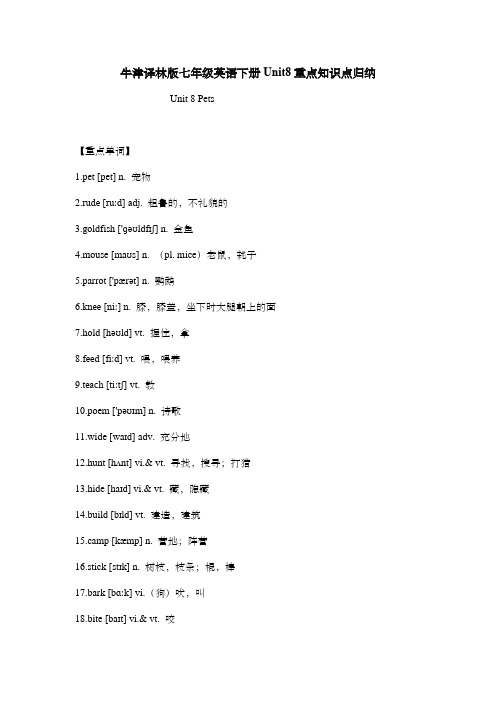
牛津译林版七年级英语下册Unit8重点知识点归纳Unit 8 Pets【重点单词】1.pet [pet] n. 宠物2.rude [ruːd] adj. 粗鲁的,不礼貌的3.goldfish ['ɡəʊldfɪʃ] n. 金鱼4.mouse [maʊs] n. (pl. mice)老鼠,耗子5.parrot ['pærət] n. 鹦鹉6.knee [niː] n. 膝,膝盖,坐下时大腿朝上的面7.hold [həʊld] vt. 握住,拿8.feed [fiːd] vt. 喂,喂养9.teach [tiːtʃ] vt. 教10.poem ['pəʊɪm] n. 诗歌11.wide [waɪd] adv. 充分地12.hunt [hʌnt] vi.& vt. 寻找,搜寻;打猎13.hide [haɪd] vi.& vt. 藏,隐藏14.build [bɪld] vt. 建造,建筑15.camp [kæmp] n. 营地;阵营16.stick [stɪk] n. 树枝,枝条;棍,棒17.bark [bɑːk] vi.(狗)吠,叫18.bite [baɪt] vi.& vt. 咬19.fight [faɪt] vi.& vt. 打仗(架);与……打仗(架)20.till [tɪl] prep. 到……时,直到……为止21.end [end] n. 终止;末尾,终点22.trouble ['trʌbl] n. 麻烦23.bubble ['bʌbl] vi. 吐泡泡24.gentle ['dʒent(ə)l] adj. 温柔的25.touch [tʌtʃ] n. 触摸,碰26.rhyme [raɪm] vi. 押韵27.care [keə] n. 照料,照顾28.anywhere ['enɪweə] adv. 任何地方29.repeat [rɪ'piːt] vi.& vt. 重复30.agree [ə'griː] vi.& vt. 同意;应允31.keep [kiːp] vt. 养,饲养32.weigh [weɪ] linking v. 重;有……重33.gram [ɡræm] n. 克34.talk [tɔːk] n. 讲座;演讲35.noise [nɔɪz] n. 声音,响声;噪音36.brush [brʌʃ] vt. 刷;擦37.fur [fɜː] n.(动物的)软毛,毛皮38.paw [pɔː] n.(动物的)爪39.basket ['bɑːskɪt] n. 篮子40.noisy ['nɔɪzi] adj. 吵闹的,嘈杂的【重点短语】1.something to eat 一些吃的东西2.sleep on my knees 睡在我的膝盖上3.hold sth in one’s hand 某人手里握着某物4.teach sb to do sth 教某人做某事5.with eyes open wide 睁大眼睛6.build me camps out of sticks 用树枝为我搭建营地7.look after 照顾8.look around for me 四处找我9.take care of 照顾10.repeat my words 重复我的话11.all the time 一直,总是12.in the sun 在阳光下13.weigh about 40 grams 重约40克14.grow up 成长;长大成人15.make any noise 发出任何噪音16.brush her fur 给她刷毛17.sleep in a basket 睡在篮子里【重点句型】1.Bring me my lunch.把午餐给我带来。
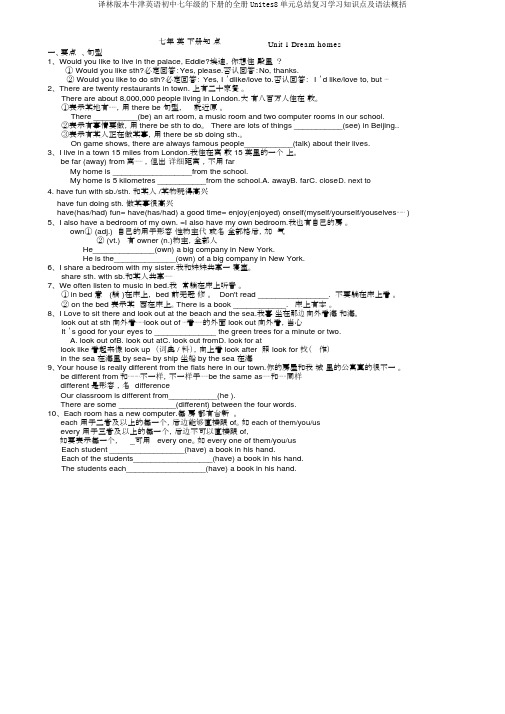
七年英下册知点Unit 1 Dream homes一、要点、句型1、 Would you like to live in the palace, Eddie?埃迪,你想住殿里?① Would you like sth?必定回答:Yes, please.否认回答:No, thanks.② Would you like to do sth?必定回答:Yes, I’dlike/love to.否认回答:I’d like/love to, but⋯2、 There are twenty restaurants in town.上有二十家餐。
There are about 8,000,000 people living in London.大有八百万人住在敦。
①表示某地有⋯⋯,用there be 句型,就近原。
There __________(be) an art room, a music room and two computer rooms in our school.②表示有事情要做,用there be sth to do。
There are lots of things ___________(see) in Beijing..③表示有某人正在做某事,用there be sb doing sth.。
On game shows, there are always famous people___________(talk) about their lives.3、 I live in a town 15 miles from London.我住在离敦15 英里的一个上。
be far (away) from离⋯⋯,但出详细距离,不用farMy home is __________________from the school.My home is 5 kilometres ___________from the school.A. awayB. farC. close D. next to4.have fun with sb./sth. 和某人 /某物玩得高兴have fun doing sth. 做某事很高兴have(has/had) fun= have(has/had) a good time= enjoy(enjoyed) onself(myself/yourself/youselves⋯⋯) 5、 I also have a bedroom of my own. =I also have my own bedroom.我也有自己的房。

沪教牛津版初中英语七年级下册Unit 8知识点梳理Unit8单词career n.事业planet n.行星[ˈplænɪt]satellite n.卫星['sætəlaɪt]velvet n.丝绒,天鹅绒['velvɪt]diamond n.钻石[ˈdaɪəmənd]shoot v.(朝某个方向)射,冲,飞驰[ʃɒt]host v.主持[həʊst]knowledge n.知识[ˈnɒlɪdʒ]lively adj.生动的['laɪvli]last v.持续[lɑːst]actually adv.事实上['æktjʊəli]anybody pron.任何人[ˈenɪˌbɒdi]achieve v.(凭长期努力)达到(某目标、地位、标准)[əˈtʃiːv]sail v.驾驶帆船航行[seɪl]decide v.决定[dɪ'saɪd]train v.训练,接受训练[treɪn]alone adv.独自[ə'ləʊn]in the future 将来used to 曾经go outside 外出look like 看起来像...more and more 越来越多grow up 长大['grəʊʌp]go sailing 去进行帆船运动Unit8课文My lifetime hobby-studying stars我一生的兴趣爱好—研究星星by Patrick Moore帕特里克·摩尔When I was eight, I got a book about stars.我八岁的时候,得到了一本关于星星的书。
That was the beginning of my lifetime hobby.那就是我一生中兴趣爱好的开始。
I used to go outside with my mum on clear nights and look at the sky. 我过去常常在明媚的夜晚和我的妈妈出去看星空。
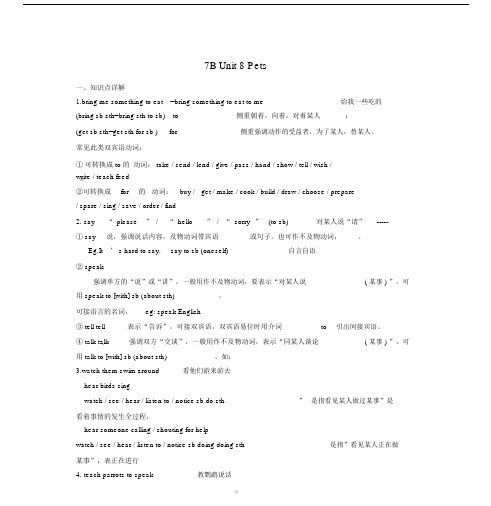
7B Unit 8 Pets一、知识点详解1.bring me something to eat =bring something to eat to me给我一些吃的(bring sb sth=bring sth to sb) to侧重朝着,向着,对着某人;(get sb sth=get sth for sb ) for侧重强调动作的受益者,为了某人,替某人。
常见此类双宾语动词:①可转换成 to 的动词: take / send / lend / give / pass / hand / show / tell / wish /write / teach feed②可转换成for的动词:buy /get / make / cook / build / draw / choose / prepare/ spare / sing / save / order / find2. say“ please” /“ hello” /“ sorry”(to sb)对某人说“请”-----① say说,强调说话内容,及物动词带宾语或句子。
也可作不及物动词,。
Eg.It ’ s hard to say. say to sb (oneself)自言自语② speak强调单方的“说”或“讲”,一般用作不及物动词,要表示“对某人说( 某事 ) ”,可用 speak to [with] sb (about sth)。
可接语言的名词,eg: speak English③ tell tell表示“告诉”,可接双宾语,双宾语易位时用介词to引出间接宾语。
④ talk talk强调双方“交谈”,一般用作不及物动词,表示“同某人谈论( 某事 ) ”,可用 talk to [with] sb (about sth)。
如:3.watch them swim around看他们游来游去hear birds singwatch / see / hear / listen to / notice sb do sth”是指看见某人做过某事”是看着事情的发生全过程,hear someone calling / shouting for helpwatch / see / hear / listen to / notice sb doing doing sth是指”看见某人正在做某事”,表正在进行4. teach parrots to speak教鹦鹉说话teach sb to do sth教某人做某事teach sb sth =teach sth to sb教某人--teach sb how to do sth教某人如何做某事5.the cleverest animal of all最聪明的动物the biggest restraunt in Tifth Street五大街上最大的餐馆6.wonder n.奇迹v.想知道wonderful adj精彩的wonderfully adv精彩地7.build me camps out of sticks用树枝造①常见短语:build ----out of用---建造---1make a bird out of wood make ---out of用---制作---take a watch out of its pocket take out of从-----中取出---- helpMrs Sun out (of the fire )help out of帮----从中逃离get out of② build sb sth = build sth for sb替某人建造----※※ unt with eyes open wide睁大眼睛寻找do sth with eyes open wide睁大眼睛做某事with复合结构表动作的伴随,通常为:① with +n+adj sleep with eyes closed / open ;② with +n+prep come in with a big smile on one’ s facego to school with a big bag on one’ s backleave the office with lights on / off8.till the end直到最后eg look after him till the endnot ------till直到----才eg. do / does / did / will not do homework till9.pmdon ’ t have to do = don’ t need to do不必做某事9. look around环顾四周常见与look搭配的短语look up/down朝上/下看look after照顾look for寻找look out当心/朝外看look out of sth朝------外看look out at sth眺望--- look at朝------看look adj看上去/看起来----- look like sth看上去/看起来像-----10.be afraid of害怕be afraid to do害怕做某事be afraid that恐怕,担心---11.There’ s nothing wrong with keeping a snake if you like.如果你喜欢,养蛇并没有错。
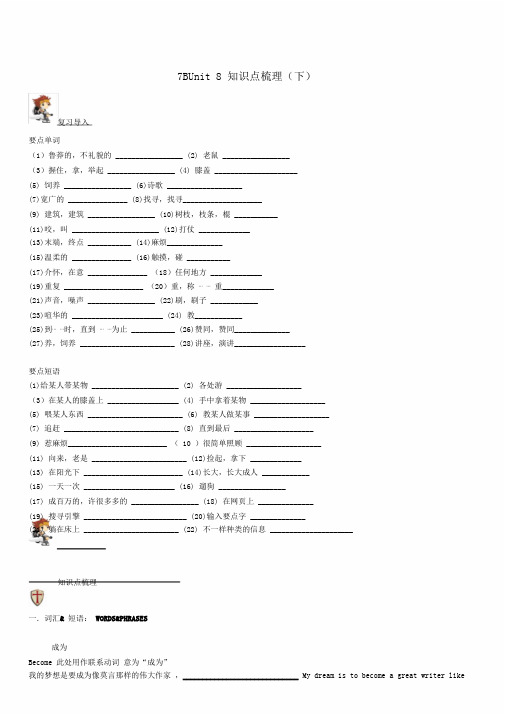
7BUnit 8 知识点梳理(下)复习导入要点单词(1)鲁莽的,不礼貌的 _________________ (2) 老鼠 _________________(3)握住,拿,举起 _________________ (4) 膝盖 _____________________(5) 饲养 _________________ (6)诗歌 ___________________(7)宽广的 _______________ (8)找寻,找寻____________________(9) 建筑,建筑 _________________ (10)树枝,枝条,棍 ___________(11)咬,叫 ______________________ (12)打仗 _____________(13)末端,终点 ___________ (14)麻烦______________(15)温柔的 _______________ (16)触摸,碰 ___________(17)介怀,在意 _______________ (18)任何地方 _____________(19)重复 ____________________ (20)重,称⋯⋯重_____________(21)声音,噪声 _________________ (22)刷,刷子 ____________(23)喧华的 _______________________ (24) 教____________(25)到⋯⋯时,直到⋯⋯为止 ___________ (26)赞同,赞同______________(27)养,饲养 ________________________ (28)讲座,演讲__________________要点短语(1)给某人带某物 ______________________ (2) 各处游 ___________________(3)在某人的膝盖上 __________________ (4) 手中拿着某物 ___________________(5) 喂某人东西 ________________________ (6) 教某人做某事 ___________________(7) 追赶 _____________________________ (8) 直到最后 ____________________(9) 惹麻烦_________________________ ( 10 )很简单照顾 ___________________(11) 向来,老是 ________________________ (12)捡起,拿下 _____________(13) 在阳光下 _________________________ (14)长大,长大成人 ____________(15) 一天一次 _______________________ (16) 遛狗 _________________(17) 成百万的,许很多多的 _________________ (18) 在网页上 ______________(19) 搜寻引擎 __________________________ (20)输入要点字 ______________(21) 躺在床上 ________________________ (22) 不一样种类的信息 _____________________知识点梳理一.词汇& 短语:WORDS&PHRASES成为Become 此处用作联系动词意为“成为”我的梦想是要成为像莫言那样的伟大作家,_____________________________ My dream is to become a great writer likeMo Yan.第 1 页辨析: become ,get turnbecome ,get turn 用作连系动词,意为“成为”(1) become 常用来表示身份、职位的变化。
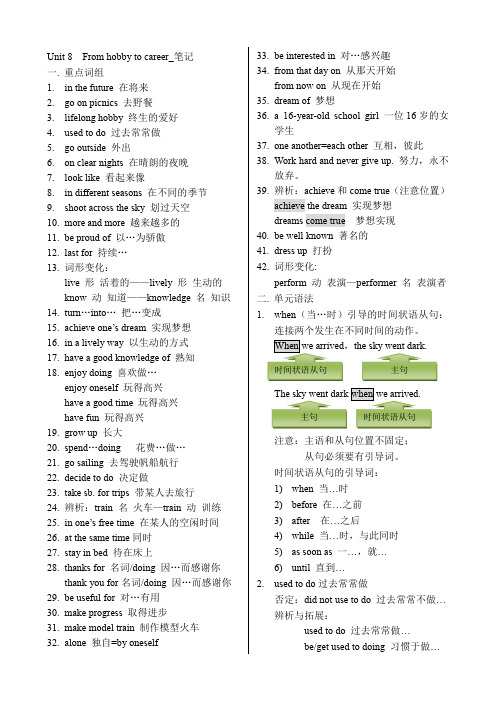
Unit 8 From hobby to career_笔记一.重点词组1.in the future 在将来2.go on picnics 去野餐3.lifelong hobby 终生的爱好ed to do 过去常常做5.go outside 外出6.on clear nights 在晴朗的夜晚7.look like 看起来像8.in different seasons 在不同的季节9.shoot across the sky 划过天空10.more and more 越来越多的11.be proud of 以…为骄傲st for 持续…13.词形变化:live 形活着的——lively 形生动的know 动知道——knowledge 名知识14.turn…into…把…变成15.achieve one’s dream 实现梦想16.in a lively way 以生动的方式17.have a good knowledge of 熟知18.enjoy doing 喜欢做…enjoy oneself 玩得高兴have a good time 玩得高兴have fun 玩得高兴19.grow up 长大20.spend…doing 花费…做…21.go sailing 去驾驶帆船航行22.decide to do 决定做23.take sb. for trips 带某人去旅行24.辨析:train 名火车—train 动训练25.in one’s free time 在某人的空闲时间26.at the same time同时27.stay in bed 待在床上28.thanks for 名词/doing 因…而感谢你thank you for名词/doing 因…而感谢你29.be useful for 对…有用30.make progress 取得进步31.make model train 制作模型火车32.alone 独自=by oneself 33.be interested in 对…感兴趣34.from that day on 从那天开始from now on 从现在开始35.dream of 梦想36.a 16-year-old school girl 一位16岁的女学生37.one another=each other 互相,彼此38.Work hard and never give up. 努力,永不放弃。
Unit 8 Pets单元知识点总结◆bring sb sth=bring sth to sb 把某物带给某人bring me my lunch=bring my lunch to me 把我的午饭拿来◆something to eat 吃的东西◆something to drink 喝的东西◆watch sb do sth观看某人做了某事或经常做某事watch them swim around看它们游来游去hold it in my hand 把它拿在我的手里◆feed sb sth=feed sth to sb 拿某物喂某人feed her carrots=feed carrots to her喂她吃胡萝卜◆teach sb to do sth教某人做某事teach the parrot to speak教鹦鹉说话His father is teaching him to make a kite. 他的爸爸正在教他做风筝。
◆teach sb sth 教某人某物Mr Zhang will teach us English next term.下学期张老师将会教我们英语。
◆the cleverest animal of all所有动物中最聪明的→of all所有的当中,是最高级的标志。
run after a ball 追一只球do wonderful tricks玩精彩的把戏play tricks on sb=play a trick on sb拿某人开玩笑,捉弄某人He likes playing tricks on his friends on April Fool’s Day.他喜欢在愚人节捉弄他的朋友。
◆build A out of B 用B搭建A◆build sb A out of B 用B为某人搭建Abuild me camps out of sticks用树枝给我搭帐篷build sb sth=build sth for sb 为某人建造某物◆look around for me 到处找我◆look after….. =take care of….. 照顾◆look after…..well =take good care of….. 好好的照顾◆need意思是需要,作为情态动词的时候,后面加动词原形◆need do sth需要做某事例:(1)肯定句He need have a rest. 他需要休息一下。
Unit 8 Pets一、重点词组二、重要句型1、Bring me my lunch. 把午餐给我带来。
(过去式brought)句中的bring的意思是“带来,拿来”。
Bring常后接双宾语,即“bring somebody something”或“bring something to somebody”。
2、I can feed her carrots. 我能喂胡萝卜给她吃. (过去式fed)句中feed的意思是“喂养,给予食物”。
常见的短语有feed something to . . . (把……喂给……),feed on . . .(以……为食) eg. Cats feed on fish. 猫以鱼为食。
3、With eyes open wide, he hunts when I hide. 当我躲起来的时候,他睁大眼睛来找我。
句中的介词短语with eyes open wide表示伴随情况,在句中作状语。
它的结构是with + 名词或代词(宾格)+分词/形容词/副词/介词短语/不定式。
如:The teacher came in with a book in his hand. 老师手里拿着一本书进来了。
4、He’d never bark or bite, and he doesn’t like to fight. 它从不叫,也不咬人,也不喜欢打斗。
fight(fought) with sb. 和某人打架 have a fight with sb.5、I will look after him until the end. 我将照顾他一直到最后。
look after ……well=take good care of……照顾好……句中until的意思是“直到……时候”,相当于till,但until比till更加正式,until 多用于句首。
not . . . till/until . . . 直到……才……She didn’t hear from her son till last Friday. 直到上星期五他才接到儿子的信。
牛津译林版七年级下册英语Unit1-Unit8各单元语法知识点复习提纲详细版Unit1 Dream homes【重点词汇】1. shareshare作及物动词,意为“分享”。
常用结构:share sth. with sb.意为“和某人合用某物;和某人分享某物”。
如:I'm afraid you have to share a table with others.我恐怕你得和别人合用一张桌子。
I often share my snacks with my classmates.我经常和同学分享零食。
2. dreamdream作名词时,意为“梦,梦想”;作形容词时,意为“理想的,不切实际的”;作动词时,意为“做梦”,常用于结构:dream of/about...(梦到……)或dream of/ about doing sth.梦想做某事。
如:Millie has a dream to have a big house米莉梦想拥有一幢大房子My dream house is a house with a big garden.我梦寐以求的房子是一幢带有大花园的房子。
I dreamed of my English teacher last night.我昨晚梦到了我的英语老师Amy dreams of being a singer when she grows up.埃米梦想长大后成为一名歌手。
3. ownown作形容词.意为“自己的,属于自己的”,常和形容词性物主代词连用,构成短语of one's own,表示“属于某人自己的”,on one's own = alone,意为“独自地”。
own作动词时,表示“拥有”。
如:I have my own computer我有属于我自己的电脑。
That's a car of her own.那是她自己的汽车。
He lives on his own.他一个人生活。
七年级英语下册Unit 7 Abilities一、重点词组二、重要句型1、Believe it or not! 信不信由你!belive/think后可接that引导的宾语从句,当主语为第一人称,后接否定意义的宾语从句时,需要否定前移。
eg. 我认为他不会通过考试。
正:I don’t think/believe that he can pass the exam.误:I think/believe that he can’t pass the exam.2、We can send some books to them. 我们可以给他们送些书。
(过去式sent)send用作及物动词,意为“寄(信等);发(电报);(派人)送”。
send sb. sth.= send sth. to sb. (give/show/lend/pass传递)borrow sth. from sb. buy sb sth.= buy sth. for sb.拓展:①send up 发射②send for (派人去)请来3、Some children are not even able to pay for school. 一些孩子甚至不能付上学的钱。
able形容词,意为“有能力的;能干的”。
如:Your father is an able man.be able to 能;会。
相当于can/could,但be able to 有一般将来时。
sb. pay (sb.) for sth. 某人付给(某人)钱买某物过去式paidsb. spend +时间/金钱(in)doing sth./ on(doing) sth. 某人花费时间、金钱做某事。
It takes sb. some time to do sth. 做某事花费了某人多长时间。
sth. cost sb.+ 金钱某物花了某人多少钱4、He was brave enough to save his neighbour from a fire.他足够勇敢将他的邻居从火中救了出来。
Unit 8 From hobby to career词性转换1. shoot 射(过去式: shot, v-ing: shooting)2. host (v.) 主持(n.) 主持人,主人,东道主3. knowledge (不可数n.) 知识4. actually (adv.) 事实上——actual (adj.) actually = in fact5. decide (v.) 决定—— decision (n.)6. train (v.) 训练(n.) 火车7. lively (adj.) 生动的类似:lovely, friendly8. grow up 长大grow——grew (过去式)词汇详解1. host (v.) 主持(n.) 主持人,主人,东道主He Jiong is a host of Happy Camp in HNTV.何炅是湖南电视台《快乐大本营》的一名主持人。
Jack will host the programme tonight.杰克将要主持今晚的节目。
【运用】根据汉语意思,完成句子。
(1) 李明长大想做一名主持人。
Li Ming wants to be _______ _______ when he grows up. (2) 露西明天将要主持新年晚会。
Lucy _______ _______ the New Year Party tomorrow.2. decide (v.) 决定—— decision (n.)decide to do sth. : “决定去做……” make a decision : “作决定”He decided to go on holiday to Hainan with his parents.他决定和他父母去海南度假。
After having a discussion, I finally made a decision.讨论过后,我最终做出决定。
【运用】根据汉语意思,完成句子。
(1) 莉莉决定和露西一起去上海读书。
Lily _______ _______ _______ with Lucy in Shanghai.(2) 汤姆,你应该尽快做决定。
Tom, you should _______ _______ _______ as soon as possible. 3. train (v.) 训练(n.) 火车train sb. / sth. train to do sth.I will go to Beijing by train.His job is training these dogs.She is training to be a volunteer. 她正在接受志愿者培训。
【运用】根据汉语意思,完成句子。
李雷昨天乘火车去了伦敦。
Li Lei _______ _______ _______ to London yesterday.爱丽丝正在接受护士的培训。
Alice is _______ _______ _______ a nurse.4. Studying the stars was great fun for me.注意:动词的ing形式做主语时,谓语要用单数形式。
(1) _______ more books in our free time _____ good for us.空闲时间多读点书对我们有好处。
(2) ________ _____ music _____ a good way to relax ourselves.听音乐是一种放松我们自己的好办法。
(3) _______ _______ _______ after supper _______ good for our health.晚饭后散步对我们的健康很有好处。
5. I am proud of my TV programme – it has lasted for more than 50 years! be proud of… “为……而感到自豪”My brother is a good teacher, and my parents are proud of him.我哥哥是个好老师,我父母都为他感到自豪。
Lily won the English competition last year. Her parents were proud of her. 莉莉去年在英语竞赛中获胜,她的父母都为她感到自豪。
【练习】根据汉语提示,完成句子。
杰克是一名很有名的教授,他的老师们都为他感到自豪。
Jack is a very famous professor. His teachers _______ _______ _______ him.6. more and more + n. 越来越多……more and more + adj. / adv. 越来越……More and more children are getting fat.English is becoming more and more important.造句:(1) 现在越来越多的人习惯于下午跑步了。
_____________________________________________(2) 这公园变得越来越漂亮了。
______________________________7. Once I learnt a little about them, I soon wanted to find out more and more.find,find out,look for都与“找”有关,但侧重点不同。
(1) I’m looking for my pen. (强调动作)(2) He can’t find his watch. (强调结果)(3) Please find out the answer to the question. (通过观察后的结果)【用法】◆look for意为“寻找”,强调找的动作◆find意为“找到、发现、感到”,强调找的结果◆find out意为“查明、发现、了解”,指经过认真观察、调查或研究把某事、某物查出来、搞清楚【运用】请根据所给汉语意思,完成下列英语句子,每空一词。
1. 最后,我在床底下找到了那本书。
I ______ _____ ______ under the bed finally.2. 我爸爸正到处找他的护照。
My father ______ ______ ______ his passport everywhere.3. 我们必须查明真相。
We must _____ ______ the truth.语法:When引导的时间状语从句&used to【when引导的时间状语从句】在复合句中,由连接词when引导的状语从句是时间状语从句。
例子:When he opened the door, he saw the bird. 当他打开门时,他看到了这只鸟。
从句主句等同于:He saw the bird when he opened the door.When she was six years old, she could play chess. 当她六岁时,她会下棋。
从句主句等同于:She could play chess when she was six years old.其具体体现在以下几个方面:1. 从句的动作和主句动作同时发生,意为“当……时;在……的时候”,例如:He liked playing basketball when he was young.他年轻的时候,就喜欢打篮球。
When Lucy was ten years old, she was interested in playing the piano.露西十岁的时候,就对弹钢琴感兴趣。
2. 从句的动作发生在主句动作之前,例如:When you get there, please tell Lucy to call me back.你到那后,请告诉露西给我回电话。
Come here to find me when you finish you homework.你做完作业后,来这儿找我。
3. 我们也可用after, before, until等连词引导时间状语从句。
如:After Simon does his homework, he listens to music.西蒙做完家庭作业后,他就去听音乐。
Before Mary went to bed, she drank some milk. 玛丽在睡觉之前,喝了些牛奶。
注意:当主句是将来时的时候,从句要用一般现在时。
—I want to know when Mr. Brown will arrive.—When he ______, I will tell you.A. will arriveB. arrivedC. arrivesD. arrive【used to的用法】used to意为“曾经;以前”,用来谈论过去常常做某事。
其句型的变化形式如下:【实战演练】根据汉语意思,完成句子,每空一词,缩写算一词。
1.杰克六岁的时候,开始学习跳舞。
_______ Jack was six years old, he _______ _______ _______ dancing. 2.看完这些书,你就可以离开了。
You can leave _______ _______ _______ reading these books.3.汤姆以前在大学里参加过音乐俱乐部。
Tom _______ _______ _______ the music club in the university.4.我以前没有和我父母去过海南度假。
I _______ _______ _______ go on holiday to Hainan with my parents.拓展:be used to doing sth. 习惯于做某事be used to do sth. 被用来做某事(表示被动)eg: She is used to taking a walk after dinner. 她习惯晚饭后散步。
Knives are used to cut things. 刀被用来切东西。
造句:(1) 我过去常常在星期天做作业。
_______________________________(2) 她习惯早起。
_____________________________(3) 木头被用来制做椅子和桌子。
_________________________________拓展:常用短语辨析:go through 遭受She has been going through a hard life. 她最近经遭着艰难的生活。